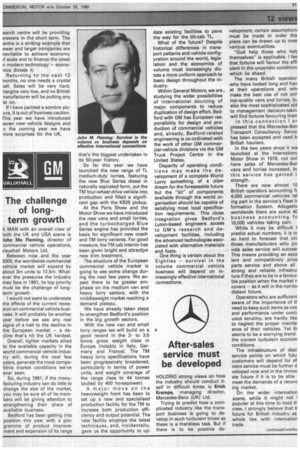The challenge of longterm growth
Page 93

If you've noticed an error in this article please click here to report it so we can fix it.
MAN with an overall view of both the UK and USA scene is John Mo Fleming, director of ommercial vehicle operations, Vauxhall Motors Ltd.
Between now and the year 2000, the worldwide commercial vehicle market will expand by about 3m units to 12.5m. Whatever the pressures the industry may face in 1981, its top priority must be the challenge of longterm growth.
I would not want to understate the effects of the current recession on commercial vehicle business. It will probably be another year before we see any real signs of a halt to the decline in the European market — a decline that's hit the UK hardest.
Overall, tighter markets allied to the available capacity in the world commercial vehicle industry will, during the next few years, generate the most competitive market conditions we've ever seen.
So, during 1981, if the manufacturing industry can do little to change the size of the market, you may be sure all of its members will be giving attention to strengthening their share of available business.
Bedford has been getting into position this year with a programme of product improvement and expansion of its range that's the biggest undertaken in its 50-year history.
So far this year we have launched the new range of TL medium-duty lorries, featuring the new Blue Series diesel in naturally aspirated form, put the TM four-wheel-drive vehicle into production and filled a significant gap with the KB25 pickup.
At the Paris Show and the Motor Show we have introduced the new vans and small lorries, and the turbocharged Blue Series engine has provided the basis for significant new coach and TM lorry variants. For good measure, the TM cab interior has been given bright and attractiye new trim treatment.
The structure of the European commercial vehicle market is going to see some change during the next few years. We expect there to be greater emphasis on the medium van and heavy lorry sectors, with the middleweight market reaching a demand plateau.
We have already taken steps to strengthen Bedford's position in the big growth sectors.
With the new van and small lorry ranges we will build on a good record in the 2to 3.5 tonne gross weight class in Europe (notably in Italy, Germany and France). The TM heavy lorry specifications have been progressively broadened, particularly in terms of power units, and weight coverage of the range rises to 44 tonnes (pulled by 400 horsepower).
A major move on the heavyweight front has been to set up a new and specialised production facility for the TM to increase both production efficiency and output potential. The new facility employs the latest techniques, and, incidentally, gave us the opportunity to up
date existing facilities to pave the way for the tilt-cab TL.
What of the future? Despite historical differences in transport patterns and vehicle configuration around the world, legislation and the economics of volume must increasingly dictate a more uniform approach to basic design throughout the industry.
Within General Motors, we are, studying the wider possibilities of international sourcing of major components to reduce duplication of design effort. Bedford with GM has European responsibility for design and production of commercial vehicles and, already, Bedford-related engineering is co-ordinated with the work of other GM commercial-vehicle divisions via the GM Truck Project Centre in the United States.
Disparity of operating conditi o ns may make the development of a complete World Lorry something of a pipedream for the foreseeable future but the "kit" of components available through the world organisation should be capable of satisfying most local specification requirements. This close integration gives Bedford's Luton-based engineers access to GM's research and development facilities, including the advanced technologies associated with alternative materials and fuels.
One thing is certain about the Eighties — survival in the volume commercial vehicle business will depend on increasingly effective international connections.
























































































































































